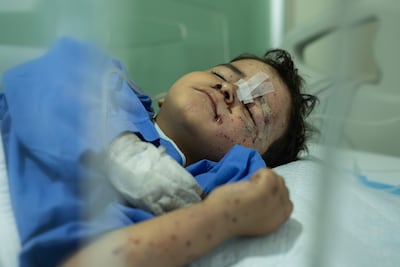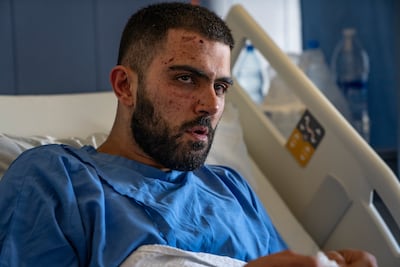Live updates: Follow the latest on Israel-Gaza
Writhing in bed with a fractured skull, his tiny right hand heavily bandaged and face maimed with wounds, two-year-old Kayan Smeha has seen enough war to last a lifetime. “There is much worse,” said a nurse at the children’s wing in the Dar Al Amal Hospital in Baalbek, in Lebanon's Bekaa Valley, in the east of the country.
Kayan had been taken to hospital on Monday morning after Israel bombed his home in the village of Chmistar, killing two and injuring eight. The little two-year-old is alone: his 28-year-old father Mohamed is downstairs, also injured with cuts across his face. “We built our house and we will stay in it even if it was half a house,” he said in a defiant tone, while clearly still in shock.
They were the first victims in the Bekaa's deadliest day since Israel intensified its bombardments of Lebanon in September. On Monday, Israeli strikes on the impoverished Bekaa and Baalbek-Hermel governorate killed nearly 70 people and wounded more than 120.

“These are massacres … I don't have the words to describe them, it's criminal,” Bilal Raad, the chief of Baalbek regional Civil Defence station told The National. He said that centres across the region have worked tirelessly into the morning to rescue survivors and put out fires caused by shelling.
While the region has come under attack in the last year, Israel has increased the scope of its assault on Lebanon in the last six weeks, turning its eyes to areas outside of the south of the country including the Bekaa.
Since Israel intensified its bombing of the region, nearly 500 people have been killed, but a series of civilian killings have been largely overlooked in this disadvantaged region.
The Dar Al Amal Hospital is full of horrific testimonies and traumatised survivors attacked by Israel in the past six weeks in their homes.

Ibtisam Hamieh, 53, is one of them. She has been at the hospital for more than a month, when Israel stepped up its assaults, dragging the Bekaa Valley – a fertile agricultural land home to some of Lebanon's most ancient sites – further into the war.
Her body is covered in third-degree burns, welts spread across her back and into her legs. Her home in Taraya was destroyed when Israel bombed it, killing 12 of her neighbours. She was burnt in the explosion and was thrown several metres through the air by the force. “I’m not afraid, because I have strength … I’m injured but I will always be resistant,” she said with a confident smile.
In his office, Ali Allam, the hospital director, said the institution has treated more than 630 wounded, many of them women and children.
The hospital has, so far, been operating largely as normal, despite several occasions where shelling has come close. A sister branch has been forced to close after a nearby missile severely damaged the building.
Unlike other places, such as Beirut’s suburbs or the southern city of Tyre, the Israeli army rarely issues eviction warnings to residents before bombing.
“There is a joke in Baalbek that even the Israelis don't care about us, so they don't tell us what to evacuate,” said Mr Allam.
Strikes on residential buildings packed with families have resulted in entire households being killed, he added. “Sometimes, there’s not much left of the dead, we only receive parts of them, we don’t receive whole bodies,” he said.
“On Sunday, there was an attack nearby, and the body was completely burnt. All you could see were the teeth.”
Israel has not commented on its latest series of strikes on the Bekaa Valley. It has repeated that its military goal is to “degrade Hezbollah”.

The region, where Hezbollah holds sway, is one of the poorest in the country, and borders Syria. Since 2006, the group "has established reliable and safe supply routes through Bekaa” to Syria, Rym Momtaz, the editor in chief of Carnegie Europe's blog Strategic Europe, told The National.
“What is currently at play is one of Israel's demands to reach a ceasefire ensuring that Hezbollah's supply routes to Syria through the Bekaa are completely disrupted,” she said.
But a high number of the victims are civilians. More than two-thirds of the victims of Monday’s attack were women and children, Bashir Khodor, the Governor of Baalbek – Hermel, said.
“Israel has demonstrated in Lebanon its ability to carry out targeted attacks. When its bombing campaign leads to such a high level of civilian damage, it is by choice. Part of Israel's strategy and policy, for instance in south Lebanon, is to depopulate entire areas in order to impose a de facto buffer zone,” Ms Momtaz said.
“They might be starting to want to do the same thing in the Bekaa”.

‘We raised them with ambition’
One of the hardest-hit villages is Khodor, south of Baalbek. On Thursday, an Israeli attack demolished a residential building and killed seven people.
Ali Hamzeh, 13, just survived. He lies rigid in a bed at Dar Al Amal in a brace with a broken neck, crying in pain through a mouth wired shut. Unable to speak, his relative, also wounded, is telling his story.
The attack damaged his family’s home, killing two of his young cousins. His father, a Lebanese Army soldier coming back from duty, feared his son had met the same fate, as he could not find him right away. Ali, propelled by the force of the explosion, was lying metres from where his home used to stand, covered by rubble.
In Khodor, some of the residential buildings are still smoking days after the attack. Children’s toys, bedsheets and French homework books and puzzles litter the rubble.
The strike left a crater where Jawad Hamzeh’s house once stood. He lost his three daughters in the strike, one of whom Nada, was a 24-year-old nurse at Dar Al Amal Hospital and was pregnant. The other two were students.
“This was my shop, this was my house. Look, film – do you see missiles there?” he said, gesturing at the rubble. He had just left the house when the attack occurred.
“Our children were living in peace, and so were our neighbours. We’re not attacking anyone. What crimes did they commit? They were just children living in peace. Are these human rights?”
He puts his arms around Fatmeh, 5, dressed in her pink nightclothes with bandages across her face. Too shocked to speak, her mother is still being treated at the hospital.
“If they want to kill men, they should kill us, not our children, our shops, our houses. We worked for 30 years to build what we have and to raise our kids to be doctors and engineers. This is our ambition in life,” he said.
Neighbours said they had to dig through the rubble with bare hands to find any survivors. The region remains isolated and rescuers faced delays because of the threat of renewed shelling.
“Israel knows all our movements, and despite this, it still decides to strike,” Sadek Hamzeh, a local official in Khodor, said, hinting at the buzzing of the Israeli drone flying above.
“This is for the international community, which claims that Israel is a free country. Look at what this democracy is doing to women and children here,” he added.
